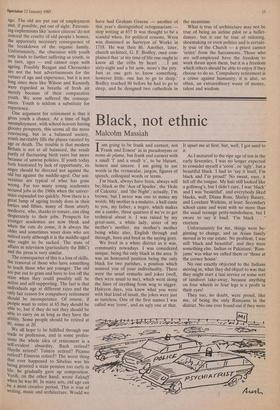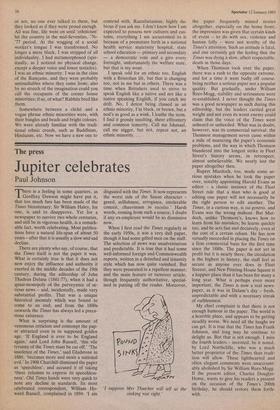Black, not ethnic
Malcolm Massiah
T am going to be frank and earnest, not .1.`Frank and Ernest' as in pseudonyms or noms de plume, but frank and earnest with a small '1' and a small 'e', to be blatant, honest and sincere. I am going to use words in the vernacular, jargon, figures of speech, colloquial words or terms.
I'm black, always have been, always will be; black as the 'Ace of Spades', the 'Hole of Calcutta', and `the Night'; actually, I'm brown, but I never was one to mince my words. My mother is a mulatto, a half-caste to you, my father, a negro, which makes me a sambo, three quarters if we're to get technical about it. I was raised by my great-aunt, a white lady, sister of my mother's mother, my mother's mother being white also, English through and through, born and bred as the saying goes.
We lived in a white district as it was, community nowadays. I was considered unique, being the only black in the area. It was an honoured position being the only black for two parishes, a position which assured you of your individuality. There were the usual remarks and jokes (well, they were usual to me), which went along the lines of anything from ,wog to nigger. Halcyon days, you knew what you were with that kind of insult, the jokes were just as tasteless. One of the first names I was called was 'coon', and an ugly one at that. It upset me at first, but, well, I got used to It.
As I matured to the ripe age of ten in the early Seventies, I was no longer expected to consider myself a 'coon', or 'ugly', but a beautiful black. I had to `say it loud, I'm black and I'm proud!' No sweat, easy, it fell off the tongue. My hair still looked like a golliwog's, but I didn't care, I was `black' and I was 'beautiful', and everybody liked blacks, well, Diana Ross, Shirley Bassey, and Lovelace Watkins, at least. Secondary school came and went with no more than the usual teenage petty-mindedness, but I swore to say it loud, 'I'm black . . etcetera.
Unfortunately for me, things were be- ginning to change, and an Asian family moved in to our estate. No problenri, I was still 'black and beautiful', and they were something else, Indian or Pakistani; 'Ram- jams' was what we called them or 'those at the corner house'.
No one exactly objected to the Indians moving in, what they did object to was that they might start a taxi service or some sort of tandoori take-away, because anything on four wheels or four legs is a profit in their eyes!
They too, no doubt, were proud, like me, of being the only Ramjams in the district. No one ever found out if they were or not, no one ever talked to them, but they looked as if they were proud enough. All was fine, life went on until 'ethnicism' hit the country in the mid-Seventies, '76- '77 period. At the wagging of a social worker's tongue I was transformed. No longer a mere black, I was stripped of all individuality, I had metamorphosed (spir- itually, as I noticed no physical change, except a deeper voice and lower testicles). I was an ethnic minority. I was in the class of the Ramjams, and they were probably untouchables where they came from; also by no stretch of the imagination could you call the occupants of the corner house minorities; if so, of what? Rabbits bred like them.
Somewhere between a cliché and a vogue phrase ethnic minorities were, with their bangles and beads and bright colours. We were already familiar with the tradi- tional ethnic creeds, such as Buddhism, Hinduism, etc. Now we have a new one to contend with, Rastafarianism, highly du- bious if you ask me. I don't know how I am expected to possess new cultures and cus- toms, everything I am accustomed to is because of a premature birth in a national health service maternity hospital, state school education — primary and secondary — a democratic vote and a giro every fortnight, unfortunately the welfare state, but that is my wont.
I speak odd for an ethnic too, English with a Bristolian lilt, but that is changing too, not in me but in others. There was a time when Britishers used to strive to speak English like a native and not like a native speaking English, if you catch my drift. No, I detest being classed as an ethnic minority, I'm black, or brown, but a nod's as good as a wink, I loathe the term. I find it grossly insulting, sheer effrontery and common temerity. Call me Ishmael, call me nigger, but not, repeat not, an ethnic minority. . . .







































 Previous page
Previous page